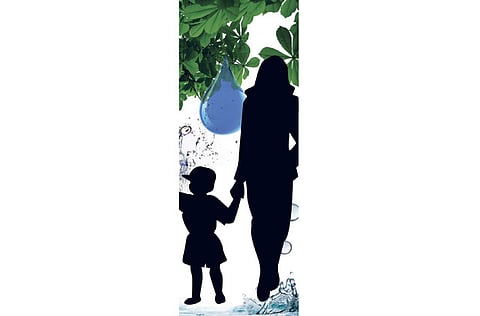Water conservation needs to be part of a continuous process
It's not enough to try and spread awareness through ill-planned campaigns

There is no doubt that water is the most precious resource on earth — it is more important than oil. From water comes all forms of life, and it is a basic prerequisite for any kind of development.
It is through Allah's blessing upon humanity that water resources are renewable, unlike oil for example, so why is there such a debate about water recently? The problem is that our water needs are growing because of population growth, rapid urbanisation, expansion of tourism and wasteful water consumption patterns in domestic, agricultural and industrial use. In the UAE, the average per capita usage ranges from 300-750 litres per day (550 litres per day on average) — one of the highest in the world.
Of course, climatic and natural conditions largely explain water scarcity in the UAE. Average annual precipitation is around 120 millimetres, although this varies. Also, high temperatures lead to high evaporation rates, which limit the use of rainwater. In addition, increasing salinisation, pollution and climate change also limit water resources.
The UAE continues to make great efforts to conserve water resources, such as building dams, making changes in agriculture and irrigation methods, as well as through desalination, waste-water treatment, strategic water storage in underground aquifers, and launching awareness campaigns about the need for water conservation.
Many bodies, including governmental organisations (such as the Ministry of Environment and Water Resources and water and electricity authorities), non-governmental organisations and even private companies organise water-conservation campaigns.
Environmental problems are usually addressed by employing a ‘policy mix' consisting of various command and control instruments (penalties and fines), economic instruments (incentives), and awareness and educational programmes.
Difficult prospect
Awareness undoubtedly plays an instrumental role in solving a lot of water-related problems. Though we hear a lot about these campaigns, creating and promoting awareness is not an easy task. Awareness is linked to each person's values and beliefs, his/her sources of information, and his/her economic and social condition in general. Therefore, we usually find a big difference in individuals' reactions and responses to such campaigns.
In fact, the water footprint and cost of many of these campaigns make them counterproductive. (Water footprint refers to direct and indirect water usage as a result of such awareness campaigns.) The big problem with such campaigns is that the targets are usually not clearly outlined — what percentage does the campaign aim to reduce water usage by and among whom, or in which sector or city or district? Should the target audience for these campaigns be the entire community or specific groups such as labourers, women, or children? It is also difficult to gauge the success of any campaign as data is often lacking.
Well-defined goals
In sum, there should be a strategic goal for awareness campaigns such as reducing per-capita consumption to match the international average. There should also be smaller targets for each campaign, according to their timing, audience etc.
Campaigns should focus on giving priority to specific groups such as children, as they represent the future, and women, as they play an important role in the house and in raising children.
Another important point to take into consideration is that awareness campaigns should be part of a continuous process. Individuals must be constantly reminded of the importance of conservation. This is likely to be a long process, but in this way we can guarantee a change in behaviour over the long term.
It is important to have specific awareness campaigns focusing on religious leaders as they can convey the message to a wider audience, especially since there are many Quranic verses, as well as the words of the Hadith, which encourage the conservation of water, even during the mandatory ablutions before prayers. Religious guidelines must be an integral part of any awareness campaign.
Last but not least, we must measure what was achieved by such awareness campaigns in order to be able to correct any mistakes or make changes in direction.
Dr Mohammad Abdel Raouf is in charge of environment research at the Gulf Research Centre, Dubai.


